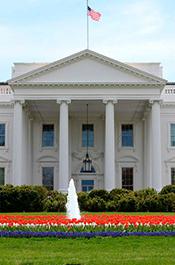Wannabe Martyr Busted For White House Plot
Nitwit, 21, never shot gun, but "watched some videos"

JANUARY 16--The wannabe martyr arrested today for scheming to attack several Washington, D.C. targets had never fired a gun, but assured his fellow plotters--both of whom were actually undercover FBI operatives--that he would use a shoulder-fired anti-tank weapon to “blow a hole in the White House.”
Like many prior radicalized nitwits, Hasher Jallal Taheb, 21, appeared penniless and relied heavily on the undercover agents to move the plot forward,  according to a complaint filed today in U.S. District Court in Atlanta, Georgia.
according to a complaint filed today in U.S. District Court in Atlanta, Georgia.
While acknowledging his lack of experience with weapons, Taheb, seen at right, assured his cohorts that he “had never shot a gun but could learn easily” and had "watched some videos...of how grenades explode.”
According to the complaint, Taheb wanted to attack the White House on January 17 using firearms, “backpacks with explosives,” and an AT-4 anti-armor weapon (pictured above). During a meeting Saturday, Taheb explained that his terrorist troupe would “attack the White House by approaching from the back road, causing a distraction for police, and then proceeding into the White House.”
Taheb was arrested today after he met with other FBI undercover agents to swap his car for weapons and explosives to be used in the planned White House assault. Taheb was the only individual not affiliated with the FBI who was involved in any aspect of the alleged plot.
During a December 14 meeting with an FBI undercover agent, Taheb said that he wanted to attack the White House, the Lincoln Memorial, the Washington Monument, and “a specific synagogue.” The complaint does not reveal how Taheb planned to carry out this audacious plan. But it does note that he wanted to locate a “base” where his fellow plotters could “regroup,” and where he could “give a speech to motivate people.”
The FBI first learned of Taheb in March, when a local law enforcement representative passed on a tip from a “community member” concerned that Taheb had “become radicalized, changed his name, and made plans to travel abroad.” (3 pages)








